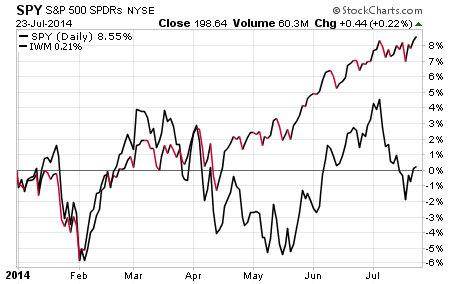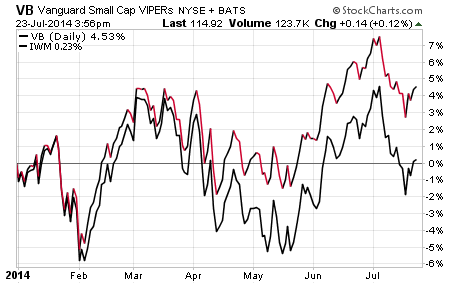One of the more persistent themes since stocks took off in April has been the underperformance of small cap stocks. Specifically market experts have been overly fixated on the iShares Russell 2000 ETF (ARCA:IWM) when compared to large cap indexes such as the SPDR S&P 500 ETF (ARCA:SPY) or PowerShares QQQ (NASDAQ:QQQ).
The crux of the issue is that large-caps continue to hit new all-time highs, while this widely followed small cap index is languishing near the flat line for the year. Depending on which two indexes you compare, there is anywhere from an 8-11% disparity in total return this year.

That’s a big margin of underperformance when you consider that the expectation is for small caps to outperform in a bull market. Smaller companies tend to benefit during cycles of economic prosperity and lead on the upside, which is why many experts are concerned that IWM is a warning signal for the end of this rally.
Some will point to the rich valuations of the Russell 2000 Index, which is currently trading at a price/earnings ratio of 75. The S&P 500 Index is trading at a much lower price/earnings ratio of 19.54.
Others will point out that the technical price pattern of iShares Russell 2000 Index (ARCA:IWM) is unhealthy, which will drag the rest of the stock market down with it. This ETF has been flirting with its intermediate and long-term moving averages all year.
While I share many of these same concerns, the fact of the matter is that it doesn’t appear to be adversely affecting the broader market as a whole to the extent that the bears would lead you to believe. We have been watching this divergence for nearly four months and it has yet to derail large-cap momentum.
Most investors have seen this evidence and fall into three categories:
- Those that are buy-and-hold for the long-term and are going to ride out whatever small caps throw their way regardless of the technical or fundamental data.
- Those that are more position or trading oriented and have likely already taken some action to reduce their exposure. They are likely sitting on a higher than normal cash position or switched to an index with better relative strength.
- Those that are looking at this underperformance as small caps working off some overbought steam and are appearing more attractive from a value standpoint than large-cap alternatives.
No matter what category you fall into, analyzing the landscape and evaluating your options can be a fruitful exercise in disciplined portfolio management.
One potential alternative to IWM if you are destined to stay in the small cap space is the Vanguard Small Cap ETF (NYSE:VB). This ETF tracks a slightly more concentrated portfolio of 1,450 stocks and has managed to gain 4.53% so far this year despite the negative small company sentiment. VB has slightly different weightings towards individual sectors, with the largest dissimilarity being an outsized exposure to industrial stocks. In addition, this ETF charges a miniscule expense ratio of just 0.09% compared to IWM’s modest annual fee of 0.24%.

Another prudent tactic to employ if you are hanging on to your small cap exposure is to set a trailing stop loss on the position to limit your downside risk. A sell discipline can provide peace of mind if stocks do fall from here, but allow you to stay invested if the market continues to climb higher. Avoiding big losses is important to protecting your invested and psychological capital.
One thing is for sure, if the market does reverse course and head lower, it will likely be from a combination of factors and not just the small cap story. Knowing why something occurred is rarely profitable. I would instead focus on your unique portfolio makeup and how best to control risks while maximizing returns as we make our way through the remainder of the year.
Disclosure : FMD Capital Management, its executives, and/or its clients may hold positions in the ETFs, mutual funds or any investment asset mentioned in this article. The commentary does not constitute individualized investment advice. The opinions offered herein are not personalized recommendations to buy, sell or hold securities.
